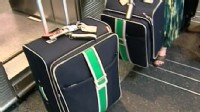(Finding that "billions" part hard to believe? Keep reading to see how a single flier can add nearly $1,000 in fees to the price of his ticket.)
For more travel news and insights, view Rick's blog at farecompare.com
What do you get for your fees? You get an airline that can still fly you from point A to point B; without fees, some carriers would go out of business just as Skybus, Aloha and others did in the past decade. Right now, the high price of oil is the big problem and, as American Airlines spokesman Tim Smith points out, "Recently costs have exceeded revenues."
Smith notes that fees are a general revenue source and pay for whatever is needed.
OK, then; do fees get us anything else besides non-bankrupt airlines, bags that are not guaranteed to arrive when you do, some pre-fab food, an extra few inches of seating space, or a dog that needs a hydrant ASAP? Yes. You might get a cool new plane.
Matt Rourke/AP Photo
Christian Noriega checks in at the... View Full Size
More Airline Fees to Come? Watch Video
Frequent Flier Logs 10 Million Miles Watch Video
Airline Fees: Industry Considers Luggage Fee Hike Watch Video
U.S. airline fleets are aging. According to a report issued by the Associated Press this spring, the average age of the planes in Delta's fleet is 16 years, while American and United are both 15 years; the average age of Southwest's fleet is close to 12, while Allegiant's is 21.5 years.
Remember that Southwest flight that had to make an emergency landing earlier this year because a hole ripped open in the fuselage? According to a recent media story, the National Transportation Safety Board probably won't have a final report on the incident until next year but preliminary findings indicated "fatigue cracks" and it has been noted by news organizations that the plane in question was 15 years old.
Passengers appreciate good planes; clean ones, anyway. Check out the 2011 J.D. Powers survey of airlines, in which the overall winner for low-cost carriers was JetBlue. It did well in many categories such as "aircraft experience," which noted whether interiors were sparkling or down-and-dirty. Of course, JetBlue has all those nice seat-back TVs on every plane, but they also have one of the youngest fleets (average age: 5.8 years, according to the AP).
Newer planes can pay off in other ways, too, such as a bigger bang for the jet-fuel buck, which, as previously noted, is a very big deal for the airlines. It's also a big deal for passengers because the cost is passed on to us in the form of higher ticket prices. According to the International Air Transport Association (IATA), new aircraft are 70 percent more fuel efficient than planes that were flying in the early 1970s, and 20 percent better than the planes in the air just 10 years ago.
Don't Pay the Fees
And when it comes to fuel savings, every little bit helps, which explains why American Airlines decided earlier this year to replace all 19,000 drink carts with new ones that are 12 pounds lighter. It saves money. Maybe they won't hurt as much when flight attendants whack you on the elbow with them, either.But nothing hurts like those fees, right? Let's pretend a fellow called Rich Flyer takes a trip on United Airlines. He checks a 32-pound bag ($25 bag fee each-way) and a second that weighs 55 pounds ($35 bag fee each-way, $100 each-way for overweight charges). He also wants a premium seat and earlier boarding, so there's another $50 each-way, plus who could pass up that tasty grilled chicken spinach salad ($9.49 each-way)?
And since Rich believes no vacation is complete without the companionship of his faithful lab Midas, add another $250 each-way for the dog's cargo accommodations.
More Airline Fees to Come? Watch Video
Frequent Flier Logs 10 Million Miles Watch Video
Airline Fees: Industry Considers Luggage Fee Hike Watch Video
But back to those new planes. There's a coolness factor, too. Same for old-but-jazzed-up planes: Delta, for instance, has just added full flatbed seats to nearly 40 planes. You'll have to pay extra though. These beds will only be available in the airline's Business Elite seating.
Maybe our buddy Rich Flyer will go for it. He reminds me of Mikey from that old TV commercial, but instead of eating anything, he'll pay anything.
If you don't have money to burn, don't pay the fees. You can start by using a carry-on every time you fly. I do, and even used a carry-on during a 10-day trip to Europe so I know it can be done. Think about that the next time you settle back into the seat of your (hopefully) brand new plane.
This work is the opinion of the columnist and does not reflect the opinion of ABC News.
Rick Seaney is one of the country's leading experts on airfare, giving interviews and analysis to news organizations that include ABC News, the New York Times, the Wall Street Journal, Reuters, the Associated Press and Bloomberg News. His website, FareCompare.com, offers consumers free, new-generation software, combined with expert insider tips to find the best airline ticket deals.




No comments:
Post a Comment